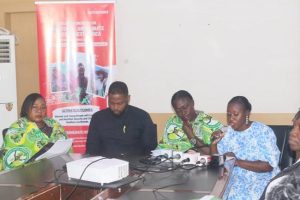The allocations to postharvest losses should urgently focus on supporting small cottage processing and storage facilities in communities based on different commodities to be owned, operated, sustained, and expanded by smallholder women farmers cooperatives. This will help address the challenges of postharvest losses experienced by smallholder women farmers across Nigeria.

This submission was made in Abuja on Friday, December 15, 2023, at a media briefing organised by ActionAid Nigeria in collaboration with the Small-Scale Women Farmers Organisation in Nigeria (SWOFON), ONE and the CAADP Non-State Actors Coalition (CNC) on the 2024 Proposed Agriculture Budget.
The briefing shed light on an analysis that focused on the proposed 2024 agricultural sector’s budget to x-ray how the Nigerian agricultural sector is funded and positioned for growth, employment creation, domestic food requirements, and export promotion of quality processed agricultural commodities.
While suggesting that solar dryers should also be provided to smallholder women farmers cooperatives in communities based on agriculture produce that can be dried to save losses, SWOFON, ONE and CAADP officials urged the Federal and State Governments to invest massively in rural roads to support transportation of agriculture produce and trade.
A budget line should be created from this budget as a yearly Strengthening Access to Credit budget line, they added, pointing out that this funding should focus on getting consultants or consultancy firms to support women, youths and farmers living with disability cooperatives to be able to navigate the too cumbersome access to credit in Nigeria.
“The team or consultancy firm will handhold the cooperatives to access existing CBN agricultural credit facilities through preparing their business proposals, interfacing, and negotiating with BOA, Bank of Industry, NIRSAL, commercial and microfinance banks.
“The team or consultancy firm will ensure that the cooperatives access such facilities and other services like extension, insurance, etc. and even market access and they are able to pay back at the end of each circle,” they stated.
They also want insurance made available and easily accessible for all women farmers across communities. Insurance products for smallholder women farmers, they added, should also be targeted at risk factors such as rainfall, drought, pests, and high temperatures.
Gender sensitiveness and responsiveness of the agriculture budget should be enhanced by increasing line items for the implementation of the National Gender Policy in Agriculture that address specific challenges that affect women farmers different from men as well as avoid lumping up budget for women farmers and other groups such as youths.
They added: “Evidence exists that irrigation has the potential to boost agricultural productivities by at least 50%. The average milk yield is as low as between 1-2 litres per day in the rainy season to only 500 ml per day in dry season. The production of fresh milk is very seasonally influenced in Nigeria, with 2/3 of the production to be achieved in the rainy season, and 1/3 in the dry season.
“Investments in irrigation is needed and can be done through the provision of solar powered boreholes across rural communities to provide water for lives and livelihoods to support households use and water for crops irrigation, water for cattle and the growing fodder which can reduce farmers and herders’ clashes across Nigeria while bringing out increased livestock and milk production.
“The Federal Government should commit 10% of her annual budget to the agriculture sector to meet the 10% Maputo/Malabo Declaration required to support at least 6% growth rate for the sector as postulated in the CAADP framework and ensure timely and total releases of the agriculture budgets towards food security, unemployment reduction and poverty eradication.
“Budgetary allocations should be increased and should go to strategic areas of investments which include Extension Services, Access to Credit, Women in Agriculture, Youth in Agriculture, Appropriate Labour-Saving Technologies, Inputs, Post-Harvest Losses Reduction Supports (processing facilities, storage facilities, trainings, market access, etc.), Irrigation, Climate Resilient Sustainable Agriculture (CRSA)/Agroecology, Research and Development, Monitoring and Evaluation, as well as Coordination.”
